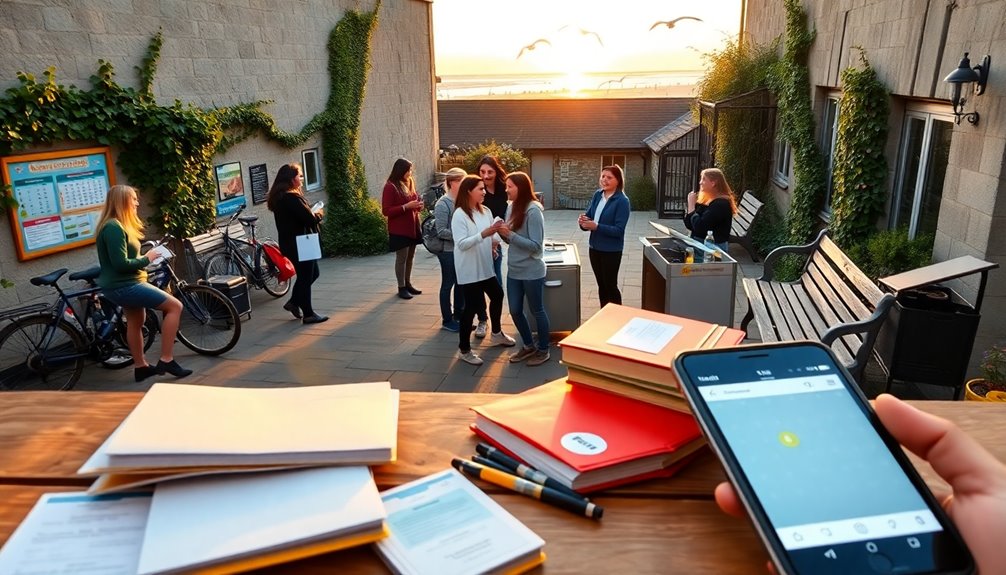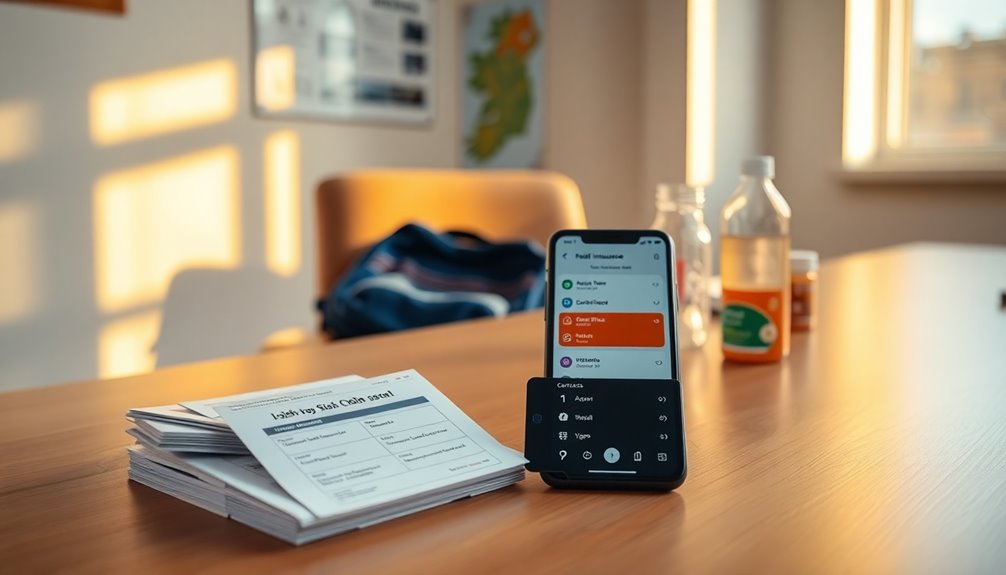
Pick a course that matches your goals (communication, exams, or work-ready fluency) and check school reputation, class size and placement policies. Bring passport, visa, enrollment letters and health records, with digital copies and translations. Book short-term homestay or student residence near transport, and get a local SIM and simple bank account on arrival. Learn a few Irish greetings and local English phrases, update your CV for part-time work or volunteering, use campus resources and join clubs — keep going to get practical checklists and step-by-step tips.
Choose the Right School and Course Level
When choosing a school and course level, start by asking what you want to achieve and how quickly — that’ll help you narrow options fast. You’ll map goals (communication, exam prep, work-ready fluency) to course selection: intensive immersion for speed, part-time for balance, exam courses for credentials. Check school reputation through alumni reviews, accreditation, and transparent outcomes rather than marketing. Think about class size, teacher qualifications, and placement testing — these affect progress more than flashy facilities. Choose a level that challenges but won’t overwhelm; ask for trial lessons or clear leveling policies. Budget freedom by comparing value: price per learning hour and included extras. Decide on location and support services that match your desired independence and daily life.
Prepare Essential Documents Before Arrival
Before you travel, make copies of your passport and any visa documents and keep both digital and paper versions so you can access them if needed. Bring your academic records and any enrollment letters for school registration, and pack health records or vaccination certificates in case clinics or the school ask. Organizing these documents in a folder will save you time and stress during arrival and enrollment.
Passport and Visa Copies
If you’re coming to Ireland to study, make at least two clear, legible photocopies of your passport and any visa pages you hold and keep them separate from the originals so you can access them if the worst happens. Keep one copy in your luggage, one with a trusted contact, and store a scanned copy in secure cloud storage. That helps with passport requirements checks and visa processing questions. Carry originals for official appointments but use copies when you want to travel light.
| Where to keep a copy | Why it helps |
|---|---|
| Luggage | Easy access if bag is searched |
| Trusted contact | Backup if you lose originals |
| Cloud storage | Fast retrieval from anywhere |
| School office | They can advise on visa processing |
| Wallet (photo) | Quick ID without risking passport |
Academic and Health Records
Since schools will ask for proof of your qualifications and immunizations, gather official academic transcripts, diploma copies, vaccination records, and any English-test certificates and keep both physical and scanned copies in an organized folder so you can produce them quickly. You’ll check each school’s transcripts requirements ahead of time so nothing slows your enrollment. Include notarized translations if documents aren’t in English. For health, carry complete immunization records and a brief medical summary noting allergies, prescriptions, and ongoing treatments. Store digital files in password-protected cloud storage and keep a USB backup. Bring contact details for your current doctor and emergency contacts. When you arrive, present documents promptly to meet deadlines and preserve your freedom to focus on classes and exploring Ireland without administrative hold-ups.
Arrange Affordable Student Accommodation Quickly

When you arrive, consider short-term homestays to give you a safe, welcoming base while you look around. If you need a lower-cost option, check budget student residences and compare weekly rates, contract length, and included utilities. Prioritize proximity to your school and public transport so you save time and money.
Short-Term Homestay Options
Although you might only need a place for a few weeks, arranging a short-term homestay quickly can save you money and reduce stress when you arrive in Ireland. You’ll get homestay benefits like included meals, laundry, and immediate local contacts — useful while you find longer-term options. Choose hosts through reputable school partners or vetted platforms, read recent reviews, and confirm arrival times. Prioritize homes near transport or your school to keep mobility and freedom. Ask about house rules, guest privacy, and any shared spaces before booking. Have a backup plan if a match isn’t right. Short stays give cultural immersion without long commitments, letting you explore neighborhoods and decide where you truly want to live.
Budget Student Residences
A budget student residence can be the quickest way to secure affordable housing, especially if you need to move in fast and want predictable costs. You’ll find budget friendly options near campuses and transport hubs that let you focus on study and exploration. Look for residences offering clear contracts, fixed utilities, and simple move-in procedures so you’re not tied up in negotiations. Shared accommodations reduce rent and create instant social networks; choose rooms with locks and respectful house rules to protect privacy. Inspect laundry, kitchen access, and Wi‑Fi reliability before committing. Plan a short trial stay if possible, know cancellation terms, and compare monthly totals rather than headline rents. This pragmatic approach keeps your living costs low and your freedom intact.
Set up a Local SIM and Banking Essentials
Before you get settled, sort out a local SIM and a basic bank account so you can communicate, get paid (if you’re working), and pay bills without costly international fees. Get a local phone plan — prepaid is flexible; pay-as-you-go or monthly SIM-only plans suit short stays. Compare coverage, data and top-up methods; keep your passport for registration if needed.
For banking options, choose a straightforward current account that offers online banking and low fees. Some banks let you open accounts with student letters; others require proof of address. Bring documents, ask about debit card delivery times, and set up mobile banking. Automate rent and bill payments to avoid missed charges, and keep emergency cash until cards arrive.
Learn Basic Irish and Local English Phrases

If you want to fit in quicker and handle everyday situations, learn a few Irish (Gaeilge) greetings and local English phrases — they’ll make ordering, asking for directions, and chatting with classmates much easier. Start with basic phrases like “Dia dhuit” (hello), “Go raibh maith agat” (thank you), and simple English slang you’ll hear in cafés or on campus. Practice asking for help, prices, or the time so you feel confident. Notice local dialects between regions — pronunciation and words change, and mimicking locals helps you connect. Use flashcards, language apps, and short exchanges with classmates. Aim for practical fluency that lets you move freely, make friends, and solve daily tasks without relying on others.
Master Public Transport and Travel Passes
You’ll want to get a Leap Card first — it’s the cheapest way to pay for buses, trams (LUAS) and many trains in Ireland. Learn simple tips for boarding and fares on local buses and trams, and always check schedules and platforms for trains. For intercity trips, plan routes and book in advance to save money and avoid last-minute stress.
Understanding Leap Card
Because you’ll likely use Dublin’s buses, trams (Luas), and trains often, getting a LEAP Card right away makes travel cheaper and simpler — you tap on and off, load credit or a student pass, and fares cap automatically so you don’t overpay. You’ll enjoy leap card benefits like lower fares, daily/weekly caps, and easy top-ups online or at machines. For practical leap card usage, register your card to protect balance, carry it when travelling, and check balances before trips. If you’re a student, link your student pass to save more and move freely. Keep receipts for refunds and know how to replace a lost card. This gives you independence on a budget while keeping travel stress-free and efficient.
Bus, Tram, Train Tips
When you start using Dublin’s buses, trams (Luas) and trains regularly, getting comfortable with schedules, ticket types and simple routines will save time and money — learn peak vs off-peak times, where to tap with your LEAP Card, and how to read route numbers and stops so you don’t waste trips. Plan around bus routes, tram schedules and train services using navigation apps for live departures and platform info. Choose transport passes to lower ticket prices and combine travel discounts for students. Learn simple commuter tips: tap on/off, keep passes charged, and allow extra time during busy hours. Follow basic safety guidelines on platforms and vehicles, secure your belongings, and ask staff if you’re unsure. Public transport gets you freedom to explore efficiently.
Intercity Travel Planning
If you want to explore beyond Dublin, planning intercity trips around timetables, ticket types and travel passes will make journeys smoother and cheaper. You’ll check train schedules and coach times, then build simple travel itineraries that match your class days and free time. Compare single, return and open tickets — advance fares save money but need fixed dates. Consider railcards or weekly/monthly passes if you’ll travel often; they offer flexibility and lower per-trip costs. Book online to reserve seats on popular routes, and use apps for real-time updates. Pack light, leave buffer time for connections, and keep digital and printed tickets handy. With basic planning you’ll travel freely, confidently, and within budget.
Find Part-Time Work and Volunteering Opportunities
Finding part-time work or volunteering while studying in Ireland can stretch your budget and boost your English in real situations, so start by checking your student visa rules and the school’s job board for approved options. You’ll want a clear job search plan: update your CV, set weekly applications, and target flexible roles. Volunteering benefits include networking, local experience, and low-pressure practice speaking. Balance hours with classes and choose roles that let you explore Irish culture.
| Option | Time | Benefit |
|---|---|---|
| Café/bar | Evenings | Customer English |
| Tutor/assistant | Mornings | Teaching practice |
| Charity/NGO | Weekends | Community ties |
Use apps and school contacts, keep records for immigration, and pick what preserves your freedom.
Build a Study Routine With Campus Resources

Because campus resources are designed to support your learning, set a routine that links class times with those services — schedule library sessions after lectures, book weekly meetings with tutors, and join conversation clubs that match your level. You’ll shape study schedules that balance focused work, review, and breaks, so you stay productive without burning out. Map available resources — writing centers, language labs, academic advisors — onto weekly blocks and use resource utilization to track what helps most. Reserve consistent times for feedback, practice, and quiet study, and treat them as nonnegotiable appointments. This pragmatic approach gives you freedom to explore campus life while keeping progress steady, adaptable, and measurable as your skills grow.
Join Clubs and Social Groups for Fast Connections
You’ve scheduled study blocks and regular tutor sessions — now use clubs and social groups to speed up real-world practice and make friends who’ll keep you motivated. Join social clubs that match your interests — sports, drama, book groups — and commit to regular meetings so English becomes practical, not just theoretical. Attend networking events hosted by the school or city to meet peers, local students, and professionals; practice introductions, ask questions, and swap contact details. Balance structured practice with relaxed conversation: volunteer for roles, lead a small project, or organize casual meetups. Track progress by noting new phrases and confidence gains after each session. These activities give freedom to explore language naturally while building a supportive network that sustains your learning.
Manage Health, Insurance, and Emergency Contacts

When you arrive, get acquainted with local healthcare options, your insurance coverage, and a short list of emergency contacts so you’ll know exactly what to do if something comes up. Identify the nearest GP, walk-in clinic, and pharmacy, and note opening hours. Check your health insurance policy for coverage limits, emergency procedures, and how to claim abroad. Save emergency contacts on your phone and a paper copy: local ambulance number, your school’s emergency line, host family or landlord, and a trusted friend. Register with the school’s student services and ask about on-campus medical support. Carry essential prescriptions and a simple first-aid kit. Knowing these basics keeps you independent, reduces stress, and helps you focus on learning and exploring.
Some Questions Answered
Can I Bring Prescription Medication, and What Documentation Is Required?
Yes — you can bring prescription medication, but check import regulations; you’ll need medication documentation like prescriptions and a doctor’s letter, keep originals and copies, declare at customs, and carry meds in labeled, secure packaging for freedom of travel.
Are There Student Discounts for Museums and Cultural Attractions?
Yes — you’ll usually get student rates; don’t assume ID alone works, bring your student card or ISIC. Museum access is often discounted, with cultural discounts at many sites — plan ahead to save time and money.
How Do I Register With the Local GP (Doctor) as an International Student?
You register by contacting a local GP practice, proving student status and ID, completing healthcare registration forms, and asking about student medical services; you’ll get a medical card or GMS guidance if eligible and choose a convenient GP.
Can I Extend My Visa or Change Course While in Ireland?
Yes — you can usually extend your visa and explore course change options; follow the visa extension process, consult your school’s immigration officer, keep permits valid, provide necessary documents, and plan so you’ll retain freedom to study and stay.
What Are My Rights and Hours for Holiday Pay in Part-Time Jobs?
Imagine your paychecks humming like steady footsteps: you’re entitled to holiday pay pro rata once you’ve worked a qualifying period, and your part time rights protect pay, breaks and leave accrual based on hours worked.
Summing Everything Up
You’re about to start something big — and you might not yet know how it’ll change you. Keep your documents ready, your budget tight, and your phone charged, but stay open: join that club, ask for help, take the part-time job, learn the local lilt. Small choices compound fast. If you follow these practical steps and use campus resources, you’ll land where you need to be — and when it happens, you’ll suddenly realize you’ve become more confident than you expected.
